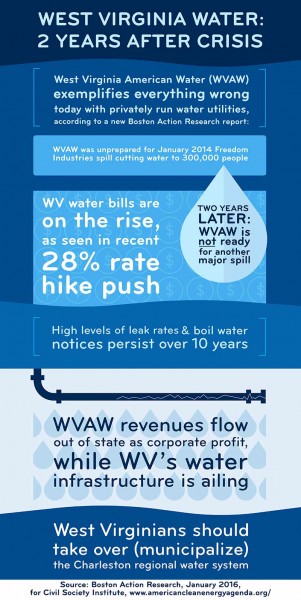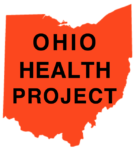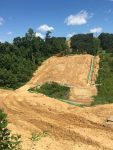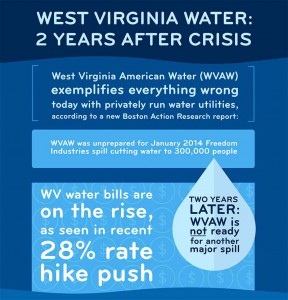January 9 marked the second anniversary of the chemical spill that left 300,000 West Virginians without tap water for more than a week.
On January 9, 2014, a leaking tank at Freedom Industries’ tank farm spewed about 10,000 gallons of coal-cleaning chemicals into the Elk River, about a mile upstream from West Virginia American Water’s (WVAW) intake. The water company had not prepared for such an event and massively bungled its response.
The state Public Service Commission (PSC) launched an investigation into how WVAW responded to the crisis. But, as you know if you’ve been following local news, the PSC may be considering abandoning its long-stalled investigation.
Advocates for a Safe Water System is urging West Virginians to sign this petition telling the PSC it should not drop its investigation.
Advocates is an all-volunteer group that arose out of the chemical spill disaster. Also arising from that devastating fiasco is a movement to take back the privately-owned WVAW, that is, a movement to municipalize the water system, to make the water system public, for the public good.
A quick Google search can reveal a little of how much has been written about the world-wide troubles with water privatization and the world-wide movement to demand that water be a public right. (Here’s just one interesting website and one water heroine.) But, we didn’t have much information of the perils of water privatization right here in central West Virginia.
 That changed two days prior to the two-year anniversary of the spill, when our good friends at the Civil Society Institute (CSI) released a report showing that the privately owned WVAW still has not taken the necessary steps to prepare for a future crisis, hold down rates, avoid major service disruptions, and invest in ailing infrastructure.
That changed two days prior to the two-year anniversary of the spill, when our good friends at the Civil Society Institute (CSI) released a report showing that the privately owned WVAW still has not taken the necessary steps to prepare for a future crisis, hold down rates, avoid major service disruptions, and invest in ailing infrastructure.
To report is titled “West Virginia American Water Company and the Case for Public Ownership and Operation.” Key report findings include the following:
- WVAW was unprepared for the January 2014 Freedom Industries spill that impacted 300,000 of its customers. The WV PSC found that WVAW violated numerous regulations in the wake of the disaster, including failure to: notify the public on a timely basis, maintain their system, have adequate storage capacity, have water pollution monitoring equipment, and have a source water protection plan.
- WVAW continues to be unprepared for a major spill today, two years after the 2014 accident.
- WVAW has been unable to control water bills through expansion of its system to include ever more ratepayers. The recent 28 percent rate hike push is a clear indication of this problem.
- Despite frequent rate cases that increase water rates, problems of high leak rates and boil water notices have been persistent for WVAW over the last 10 years.
- WVAW pays a higher percentage of its profits in dividend payments to its parent corporation, American Water Company, than its subsidiaries in other states on average, which sends precious financial resources out of West Virginia that could otherwise be invested in the water system.
- There are options for local officials and the public to look into municipalizing the Charleston regional water system: (1) generally, local government has the ability to raise funds and accept state and federal dollars for its purposes; (2) a takeover could be negotiated if WVAW were willing to sell, or local government could seek to use eminent domain; (3) although legal analysis is required, West Virginia law provides for the formation of regional water authorities and public service districts; and (4) new legislation could be passed for the public takeover of the Charleston system.
The report notes that the evidence shows publicly owned and operated systems are just as or even more efficient than privately owned systems and that costs are lower. The situation with WVAW reflects why privatization of water systems has failed. The failure of privatization is attributed to excessive costs, poor service quality, lack of transparency, workforce cuts, and under-investment, among other things.
There is rising competition between private and public water companies for public dollars. The private water industry has been lobbying Congress for easier access to taxpayer dollars while it seeks easier access to ratepayer dollars through pay-as-you-go rate mechanisms and other preferential treatment. Despite consistent and substantial investments in water systems, local governments face challenges in upgrading and maintaining their systems due to dropping revenue and reduced federal funding over the last 30 years. Given the mounting political pressure from local governments, infusions of federal dollars (public dollars) appear inevitable to shore up American water infrastructure.
What became WVAW (a subsidiary of American Water Co., the largest private water company in the country) was founded in 1886. Since then, the company has expanded to serve 40 percent of West Virginia’s population, purchasing and entering into public-private contracts with Public Service Districts and towns across the state.
To support the movement to take back our water, e-mail info@ourwaterwv.org.












